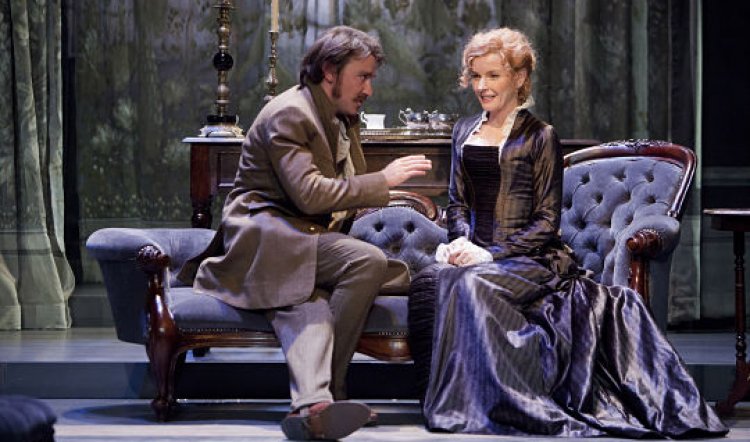
IN THE NEXT ROOM, or the vibrator play
IN THE NEXT ROOM, or the Vibrator play; Sydney Theatre Company at the Drama Theatre, Sydney Opera House to February 11-March 27. Photos: Brett Boardman
A KEY LINE in Sarah Ruhl’s scintillating play typifies its combination of wicked humour and deeper meanings: “You have no idea what a source of anguish my wife’s illness has been to me,” says anxious husband Mr Daldry, to the solicitous Dr Givings, before adding as an afterthought, “And to her, of course.”
Mrs Daldry (the superb Helen Thomson) is suffering from “hysteria”, in common with many middle class Victorian women. And the treatment – to the disbelieving amusement of a 21st century audience, particularly women – is the earnestly dispassionate application by Givings, scientist, inventor and medical practitioner, of his new therapeutic instrument: the electric vibrator.
Set in the 1880s, when electricity was still a daring novelty, the play takes place in the fashionably overblown living room (drapes, lace and many electric light fittings, as well as reassuring candle sconces) and in the adjoining mindfully austere “operating theatre” of the Givings household. It’s a beautifully thought-out, imaginative and well-rendered design by Tracy Grant Lord, with an equally thoughtful and effective lighting design by Hartley TA Kemp. Between them they have transformed the Drama Theatre space into the epitome of high Victorian domesticity in a way that is, nevertheless, highly theatrical.
In the living room Mrs Givings (a beautiful balance of fragile and feisty from Jacqueline McKenzie) is lonely, bored by her drearily polite existence and anguished that she is unable to adequately feed her baby daughter. In the next room meanwhile, Doctor and Annie, his stern assistant who is also a scholar of Ancient Greek (the deliciously subtle and generous Mandy McElhinney), minister to women whose “inexplicable” tears, fears, palpitations and vapours are lubriciously and miraculously dissolved by the new device.
Socially peripheral to these addled women and their unintentionally heedless men, but central to the historical, social and dramatic needs of the story, is Elizabeth (newcomer – to Sydney – Melburnian Sara Zwangobani in a coolly detached performance that quietly underlines her status and tragedy). She is housekeeper to the Daldrys and because her infant son has handily died, she is loaned to the Givings, rather as one might lend an umbrella, as wet nurse to their baby.
Directed by Pamela Rabe with the wit, astuteness and sensitivity we’ve long enjoyed in her best performances as an actor, the Tony- and Pulitzer-nominated play sparkles and enthrals on many levels.
What’s striking about the characters and performances is that these are women on the edge of knowing themselves, in an era when that was forbidden. Their own bodies are more mysterious to them than the new-fangled electricity: they know nothing about sex, other than that it is something they must dutifully endure. It could be speculated that the repressive nonsense of the Kensington System, under which the hapless Princess Victoria had grown up and to which she remained somewhat in thrall for the rest of her long life, can be seen in the constraints placed upon middle class Victorian women.
Despite apparently adoring Prince Albert and bearing nine children, Queen Victoria is said to have been disgusted by pregnancy and breastfeeding. When he died at just 42 she retreated into decades of mourning and seclusion and it’s almost as if the middle class women of Britain were dragged into that atrophied style of living too. Meanwhile, the aristocracy continued on its customary hedonistic way and working class women were too busy simply surviving to be bothered with the niceties of modesty and the vapours.

The vapours, of course, were the result of a combination of excruciating boredom and pointless existence on the one hand, and physical torture on the other. In an early scene that is both funny and horrifying, Mrs Daldry reluctantly undresses in the operating theatre in preparation for her treatment. Layer by layer, garment by garment, off comes her fashionable outfit. She is assisted by Annie because she is unable to dress or undress without help; she is effectively rendered helpless and infantilised by her clothes. And her corsets are so tight it’s a wonder she remains reasonably alert, rather than permanently en-vapoured. (Marvellous costumes by the STC costume department, by the way.)
Add to the physical strictures the (always middle class) taboos relating to sex and female bodies and incredulousness begins to take the place of laughter; then incredulity gives way to preoccupation with the ideas that bubble to the surface of the play the longer it goes on. Dr Givings solemnly tells Mr Daldy that his wife’s treatment will result in “paroxysms” and, if the treatment is continued for a number of days – weeks even – these will help her recover her good humour and willingness to do her wifely duty.
You need not be a historian or a brain surgeon to work out what a “paroxysm” is, and it doesn’t take Mrs Daldry long either. Not that she knows she’s experiencing an orgasm: but she does know she wants more. She also wants her new friends to have what she’s having; but it’s Victorian times and sadly it’s not quite that straightforward.
As the pompous, well-meaning husbands, David Roberts and Marshall Napier underline the depth of talent in the Sydney acting pool, while Josh McConville is a febrile Leo Irving. He’s suffering the – rarer – male form of hysteria, but as he’s an artist his condition doesn’t perturb Dr Givings. He is treated with the Chattanooga Vibrator: especially designed for male application. (All true, by the way: in the program notes Ruhl writes of the book she discovered that led her to write the play.)
This is marvellous, thoughtful entertainment: recommended.
A version of the review appeared in The Australian.



